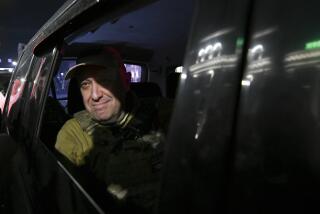Soviet Turmoil Could Leap Borders and Stir Up Europe, Analysts Warn : Baltics: The internal problem could actually breed instability throughout the continent. Scenarios include mutiny in the Red Army.
- Share via
WASHINGTON — It is the stuff of techno-fiction novels, but to some U.S. government analysts, it could become a post-Cold War nightmare--a mutiny by Soviet troops left in Germany that threatens to destroy Europe’s new order.
As the Persian Gulf War moves inexorably toward its conclusion, President Bush is being warned that growing instability in the Soviet Union could upset the peace in Europe.
In a breakfast meeting with The Times’ Washington Bureau, several top government analysts of Soviet behavior said the Administration cannot ignore Soviet unrest even if it seems driven by internal divisions rather than East-West friction.
For Americans schooled in decades of the Cold War, internal turmoil in the Soviet Union may not seem to be such a bad thing. But the analysts, who asked not to be identified, said that Soviet unrest almost certainly cannot be confined to the Soviet Union.
“If the Soviet Union or large parts of it are plunged into this turmoil--quasi or actual civil war--this has an effect on the neighboring areas,” one analyst said.
“That kind of instability will be a problem in Europe--a problem for our allies, a problem for Eastern Europe, something of a problem for us,” he said. “How much instability and how much violence there is will have a lot to do with how much concern there will be.”
One official said that if Soviet President Mikhail S. Gorbachev uses armed force to suppress dissidents in the Baltic region or, perhaps, some other rebellious republic, the conflict could echo among the Soviet forces still garrisoned in Germany.
“This (Soviet) motorized rifle Company A decides that it supports (the rebels) in the shootout that has started back in the Soviet Union and is being described vividly in the BBC and Radio Moscow as well,” one analyst theorized. “Company A decides to declare its support and has come out of its barracks in an armed demonstration. (The Soviet commander) says he can’t put up with that, so he orders Companies B and C to suppress Company A, and they start mixing it up. By and by, the Bundeswehr decides it better take a hand in this and maybe disarm all three companies. How much further do we have to go?”
The analysts said Gorbachev’s grip on power is becoming tenuous in the face of a collapsing economy and growing ethnic and political divisions. They predicted that the Soviet president will turn increasingly to repression to try to keep order. Ultimately, they said, he will fail.
“It has a spillover effect across borders, particularly if they do start renewed repression in the Baltic,” one official said. “You’re going to have fighting there. You’re going to have people trying to get across the border with Poland. You’re going to have the Eastern European states looking for quicker pledges of support from NATO for their own security.”
At best, the government analysts said, Gorbachev may be able to buy a year or two with a crackdown on dissent.
“But I don’t think it will work (in the long run),” one official said. “It won’t do anything about the economic situation, which is very, very bad. The obvious thing about Gorbachev is that he’s alienated the right and the left, and he really doesn’t have many with him in the center.
“So I don’t hold very good prospects that he can stay around a long time in this way,” the official said.
For a time, Gorbachev was perceived in the West as a genuine reformer who intended to bring the beginnings of democracy to the Soviet Union after centuries of czarist and Communist oppression. But that view seems to be fading fast.
“The reason Gorbachev engaged in these reforms is because the old system didn’t work,” one analyst said. “So after all this chaos, are they going to bring it back? This is the course that they’re on. Why should it work better now?”
Some observers of the Soviets believe that the situation is getting away from Gorbachev. The Soviet president appears increasingly tense, they say, and his recent speeches have seemed to be rambling and unfocused.
“I think he has the sense of everything breaking down, out of his hands,” one analyst said. “He is relying more on the institutions that he at one time tended to marginalize--particularly the military, the Communist Party, and the KGB--simply because if he’s going to pursue the kind of course that he’s on, they are probably the only ones that can help him, and he has to have them.”
Even the military may be a bit suspect, however, the official said, and, although the high command seems to welcome Gorbachev’s attempt to reimpose discipline, it is by no means certain that every Soviet soldier in the ranks could be counted on to fire on dissidents if called upon to do so.
“I think it’s very clear that there are great divisions within the military,” one government analyst commented. “The high command wants the empire to be held together and is quite willing to see repression used in order to hold it together--preferably not by them, but by somebody else.
“They’d prefer not to have to administer it,” he said.
More to Read
Sign up for Essential California
The most important California stories and recommendations in your inbox every morning.
You may occasionally receive promotional content from the Los Angeles Times.












